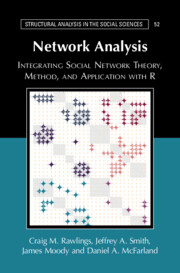Book contents
- Network Analysis
- Structural Analysis in the Social Sciences
- Network Analysis
- Copyright page
- Contents
- Figures
- Tables
- Acknowledgments
- 1 Introduction
- Part I Thinking Structurally
- 2 What Is Social Structure?
- 3 What Is a Social Network?
- 4 How Are Social Network Data Collected?
- 5 How Are Social Network Data Visualized?
- Part II Seeing Structure
- Part III Making Structural Predictions
- References
- Index
- References
5 - How Are Social Network Data Visualized?
from Part I - Thinking Structurally
Published online by Cambridge University Press: 21 September 2023
- Network Analysis
- Structural Analysis in the Social Sciences
- Network Analysis
- Copyright page
- Contents
- Figures
- Tables
- Acknowledgments
- 1 Introduction
- Part I Thinking Structurally
- 2 What Is Social Structure?
- 3 What Is a Social Network?
- 4 How Are Social Network Data Collected?
- 5 How Are Social Network Data Visualized?
- Part II Seeing Structure
- Part III Making Structural Predictions
- References
- Index
- References
Summary
Images can be powerful; and, as the saying goes, “with great power comes great responsibility.” Today, the world is suffused with images through various media, and people have come to expect pictures to tell them stories. With increased computational power, images of quantitative data are increasingly part of the “stories” one commonly sees and are powerful in communicating research findings. Many of these images are informative and effective; others are confusing, convey little actual information, or, sadly, are used to intentionally mislead for ideological reasons. Network science has always used compelling images to tell stories about structures, and the field is therefore particularly suited to make the most use of this era of data visualization. But given the vastly expanded palette of visualization available today, how does the researcher decide what is a good network image?
Information
- Type
- Chapter
- Information
- Network AnalysisIntegrating Social Network Theory, Method, and Application with R, pp. 88 - 114Publisher: Cambridge University PressPrint publication year: 2023
